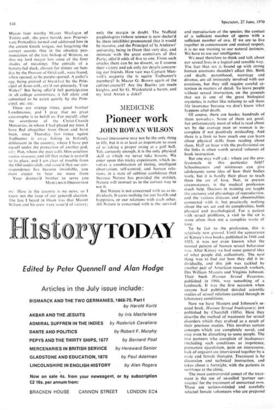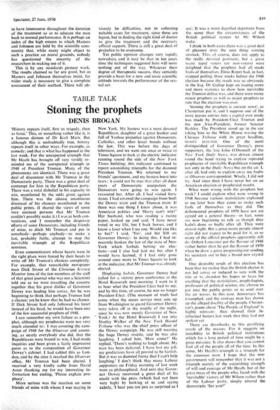MEDICINE
Pioneer work
JOHN ROWAN WILSON
Sexual intercourse may not be the only thing in life, but it is at least as important to most of us taking a proper swing at a golf ball. Yet, curiously enough, it is the only physical skill at which we never take lessons. We enter upon this tricky experiment, which in- Noises a combination of timing, intelligent observation, self-control, and human rela- tions, in a state of sublime confidence that because Nature has provided the instinct, Nature will instruct us in the correct way to use it.
But Nature is not concerned with us as in- dividuals. It cares nothing for our health and happiness, or our relations with each other. All Nature is concerned with is the survival and reproduction of the species; the contact of a sufficient number of sperm with a sufficient number of ova. If we are to live together in contentment and mutual respect, it is no use trusting to our natural instincts. We have to use our intelligence.
We need therefore to think and talk about our sexual lives in a logical and sensible way.
The fact that sex is bound up with strong human emotions shouldn't affect this. Birth and death, parenthood, marriage and divorce, are all intimately involved with our emotions, but they still require careful at- tention in matters of detail. To leave people without sexual instruction, on the grounds that sex is one of the great biological mysteries, is rather like refusing to sell them life insurance because we don't know what happens after death.
Of course, there are books; hundreds of them nowadays. Some of them are good, but unfortunately most of what is read about sex by the average man or woman is in- complete if not positively misleading. And there is a limit to how much one can learn about physical skills from reading about them. Half an hour with the professional on the links is often worth several volumes of book instruction.
But one may well ask : where are the pro- fessionals in this particular field? Schoolmasters and mistresses can give adolescents some idea of how their bodies work, but it is hardly their place to teach them the art of love. Nor, in present circumstances, is the medical profession much help. Doctors in training are taught the anatomy and physiology of reproduction. and the various diseases and abnormalities connected with it, but practically nothing about the sex act and its complexities, both physical and psychological. For a patient 1% ith sexual problems, a visit to the GP is more often than not a complete waste of time.
To be fair to the profession, this is relatively new ground. Until the appearance of Kinsey's two books, published in 1948 and 1953, it was not even known what the normal pattern of human sexual behaviour was. After Kinsey we had some general idea of what people did, collectively. The next thing was to find out how they did it in- dividually, and this job was tackled by another pair of American research workers, Drs William Masters and Virginia Johnson. Their book Human Sexual Response, published in 1966, was something of a landmark. It was the first occasion when anyone had published detailed scientific studies of sexual relations carried through in laboratory conditions.
Now we have Masters and Johnson's se- cond book, Human Sexual Inadequacy; just published by Churchill (105s). Here they describe the method of treatment for sexual disorders which they evolved as a result of their previous studies. This involves certain concepts which are completely novel, and may even be disturbing to some people. The two partners who complain of inadequacy (including such conditions as impotence, premature ejaculation, pain on intercourse, lack of orgasm) are interviewed together by a male and female therapist. Treatment is by discussion and technical instruction, and takes about a fortnight, with the patients in residence at the clinic.
The most controversial asnect of the treat- ment is the use of so-called 'partner sur- rocates' for the treatment of unmarried men. These are serious-minded and carefully selected female volunteers who are prepared
to have intercourse throughout the duration of the treatment so as to educate the men back to normal performance. It is perhaps an index of the high esteem in which Masters and Johnson are held by the scientific com- munity that, while many might object to such a practice on moral grounds, nobody has questioned the sincerity of the researchers in making use of it.
This is by any standards pioneer work. The results claimed so far are good, but as Masters and Johnson themselves insist, far wider study is necessary to give a complete assessment of their method. There will ob-
viously be difficulties, not in collecting suitable cases for treatment, since these are legion, but in finding the right kind of doctor to give the treatment and the necessary official support. There is still a great deal of prejudice to be overcome.
Yet public opinion changes very rapidly nowadays, and it may be that in ten years time the techniques suggested here will seem nothing out of the way. Whatever their degree of therapeutic success, they certainly provide a basis for a new and more scientific attitude towards the performance of the sex- ual act.































 Previous page
Previous page